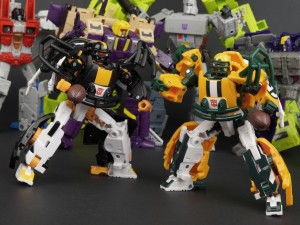This past weekend, Seibertron.com contacted Hasbro to find out if they had an official statement regarding the use of this word as a Transformers product. Here is their official response that they sent earlier on Monday:
Hasbro wrote:Thank you for bringing this matter to our attention and for the opportunity to respond. The TRANSFORMERS brand intended no offense by use of the name "SPASTIC" for one of its products which has not and will not be available via traditional retail channels in Europe, including the the UK. Thank you once again for notifying us about your concern. As a marketer of children’s products, input from parents, families and fans regarding their experiences with our brands is extremely important to us. Our goal is to have all families who enjoy our brands feel good about their purchases and experiences.
We are waiting a response from Hasbro to find out if the figure will retain the name "Spastic" in North America after finding out from the message above that the item will not be available in Europe. Stay tuned to Seibertron.com for additional information.

The "controversy" over this name usage was covered in the "weird news" section of DailyRecord.co.uk. You can view the article by clicking here.
Here is some additional information about the regional differences of the word "spastic" from Wikipedia.org:
http://en.wikipedia.org/wiki/Spastic
US usage of the word "spastic"
Wikipedia.org wrote:In American slang, the term "spaz" is largely inoffensive, and is generally understood as a casual word for clumsiness, sometimes associated with over excitement, excessive energy, or hyperactivity. Its usage has been documented as far back as the mid 1950s
UK usage of the word "spastic"
This medical term "spastic" became used to describe cerebral palsy. The Spastics Society, a UK charity for people with cerebral palsy, was founded in 1951.
However, the word began to be used as an insult and became a term of abuse used to imply stupidity or physical ineptness; one who is uncoordinated or incompetent, or a fool.[3] The mental connotation derived from a common misconception that those with any physical disability resulting in spasticity would necessarily also have a mental or developmental disability. It was often colloquially abbreviated to shorter forms such as "spaz".
Its derogatory use grew considerably in the 1980s.








